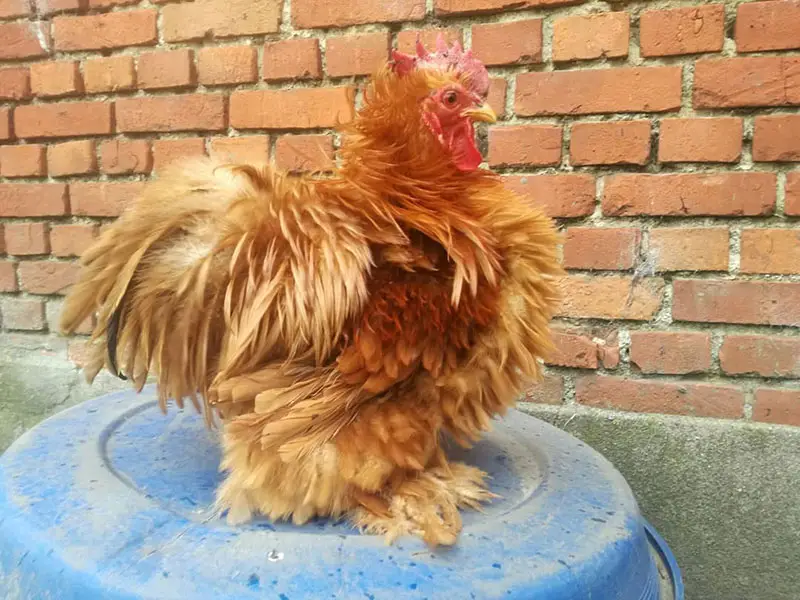If you want to keep a bird as a pet but aren’t sure which species is ideal for you, I suggest you should get a parrot. Though you may keep a variety of birds as pets, such as finches, canaries, chickens, doves, and toucans, none of them are as lovely, and gorgeous as a parrot. However, there are many different varieties of parrots available at pet stores, making it difficult to pick the finest one. Green parrots are regularly spotted in the wild and as pets. Because yellow parrots are not particularly common, you might choose one as a pet to stand out from the crowd.
Though you may keep other yellow birds as pets, such as canaries, the majority of them cannot compare to the attractiveness of parrots with vivid yellow feathers. Even though some parrots are difficult to care for, the majority of them want to be their owners’ favorite.
Yellow parrots come in a variety of sizes, from little to huge, and in different color combinations. Thus, making it difficult to choose the finest type of yellow parrot for you as a pet. In order to make things simpler for you, I’ve included a quick overview of yellow parrot species in this article.
Colorful and One-Of-A-Kind Creature
Parrots come in a variety of colors, such as blue, black, gray, brown, multicolored, green red, white, orange, and yellow. They come in three sizes: big, medium, and small, with a lifetime of roughly 30 years. Many parrots are usually vocal communicators who make noises like whistlers and chatterers, although some of them are naturally silent. They are sociable by nature, however, the extent to which they are social varies per species. Parrots are now found in over 350 different species all over the globe.
A parrot is defined as a bird with a bent beak, which is why hookbill is another term for parrots in certain locations. They have four toes in each foot, two in front and two in behind, to precisely grab tree branches. They can also control objects with their feet, much as humans do with their fingers and thumbs.
Parrots of all colors and sizes are kept as pets all over the globe, ranging from 5-inch-long little lovebirds to 40-inch-long big macaws. Some parrots have a single color, while others have a variety of colors to make them seem more attractive and distinctive. Male and female parrots in some species are completely different from one another.
Top 10 yellow parrots to keep as pets:
So, if you’ve decided to have a yellow parrot as a pet, I’ve evaluated some of the best yellow parrots in this blog to assist you in picking the ideal one for you. There aren’t many 100% yellow parrots, as there aren’t many parrots of a single color. The majority of parrots have a wide range of colors in their feathers.
The following are examples of yellow parrots:
1. Budgie (yellow parakeet)

Origin: Native to Australia
Size: 6-8 inches
Weight: 1 ounce
Life Span: 5 – 8 years
Because they’re little, sociable, chatty, and simple to train, budgies (Melopsittacus undulatus) are the most popular pet bird.
Budgies, which grow to be around 6-7 inches long, are noisy creatures that thrive in groups of other budgies.
They are loud birds that are especially in the morning. During their 8-10 hours of rest, they are peaceful.
Because of their seed-based diet, parakeets are prone to obesity. Their digestive system is designed in such a way that they constantly eat and poop.
Budgerigars live for an average of 5-8 years if they are properly cared for.
Is a budgie a good pet? Yes, budgies are excellent to keep as pets. They are social, and playful and come in a variety of beautiful colors including green, blue, and white.
Can a budgie live alone? yes, they can live alone. As they are flock birds so ideally they would prefer to live in groups but they have no problem living alone as it is one of the most popular birds around the world.
2. Pacific Parrotlet (small yellow parrot)

The pacific parrotlet (Forpus coelestis) is a little bird, being just 5 inches tall.
Their small bodies conceal a Napoleon complex, and if not tamed, these birds may be destructive and violent toward people and other animals.
Once you make a connection with them, they are affectionate and loving. They need the same amount of activity as a full-sized parrot, so plan on letting your bird fly free on a frequent basis. It will most likely calm down as a result of this.
These are talking birds that can learn up to 15 words, although they don’t scream and screech as loudly as the blue-and-yellow macaw or the double yellow-headed Amazon.
3. Lovebirds
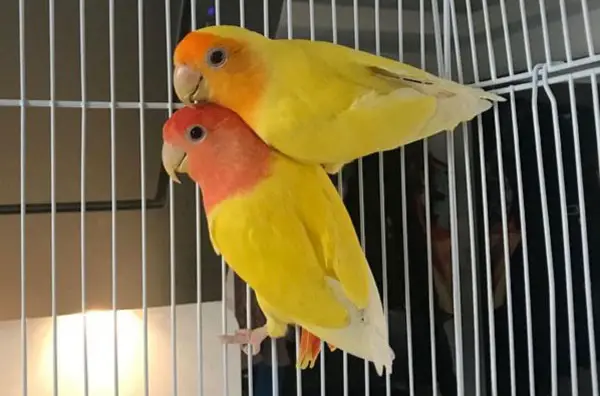
Origin: Native to the forests and savannas of Sub-Saharan Africa and Madagascar
Size: 5-7 inches
Weight: 2 ounces
Life Span: 15- 25 years.
Lovebirds (Agapornis) come in a variety of sizes, ranging from 5 to 6 inches in length. They’re tiny but stock parrots.
To get yellow feathers and red heads, most of these species undergo color changes. Fischer’s lovebirds and yellow-collared lovebirds are two examples.
Fischer’s lovebirds are loud birds that seldom talk (though females may sometimes repeat a sentence).
Do lovebirds need to be in pairs? Lovebirds do not have to live in couples or groups, despite their name. It will be enough if you can spend time with a single lovebird and keep it entertained.
4. Sun Conure

Origin: Native to South America, specifically Venezuela, Northern Brazil and Guyana.
Size: 11 inches
Weight: 4 oz
Life Span: 15 to 25 years
As a newborn, the sun conure (Aratinga solstitialis) has green plumage that soon fades to a brilliant yellow. It’s usual to have a red tinge around the eyes.
Sun conures are excellent pets if you are willing to devote time to their care. They’re affectionate and like being the center of attention.
A sun parakeet will repay your devotion. Unfortunately, if left alone for too long, these parrots grow lonely, sad, and violent. The sun parakeet can mimic human speech, although it prefers to screech and trill instead which might put a strain on your nerves.
Despite its small size (about 12 inches), the sun parakeet requires a large habitat. These are active parrots that like moving about, so they’ll require plenty of out-of-cage time.
How many Sun Conures are left in the wild? It is estimated that there are only around 2500 Sun Conures left in the wild.
5. Golden Conure

Origin: Native to the Amazon Basin of interior northern Brazil
Size: 14 inches
Weight: 9 ozs
Life Span: 30 years
The golden conure (Guaruba guarouba), a remarkably attractive parrot with nearly all yellow feathers is breathtaking. These medium-sized parrots are inquisitive and lively.
They like talking and are excellent impersonators. This breed enjoys music and will replicate ordinary sounds. When you put on the radio, don’t be shocked if your parrot begins to dance.
The golden parakeet has a large wingspan and develops to be approximately 14 inches long. That’s why their cage needs to be large
Are golden conures endangered? The golden conures are no longer endangered. Due to the commendable efforts of the authorities, it was made possible to restore their population.
6. Cockatiel

Origin: Native only to Australia
Size: 12 to 13 inches
Weight: around 4 oz
Life Span: 16 to 25 years
We’re talking about the lutino mutation of the cockatiel (Nymphicus hollandicus), which many regard to be the traditional look of a cockatiel.
The body of a lutino cockatiel is white or light yellow, with a brilliant yellow head and red cheeks.
Most cockatiels don’t reach a height of more than 13 inches. They still need a spacious cage (with stimulation) and exercise outside of the cage.
Cockatiels like to be around people and are terrific companion birds once a relationship with the owner is established. You’ll need to devote a lot of time to building trust and relationships with a cockatiel.
Cockatiels don’t talk much, but they’re excellent whistlers. Whistling from a cockatoo is generally seen as a sign of joy and affection. If your cockatiel whistles at you, it’s because it’s happy to see you.
8. Sulfur-Crested Cockatoo
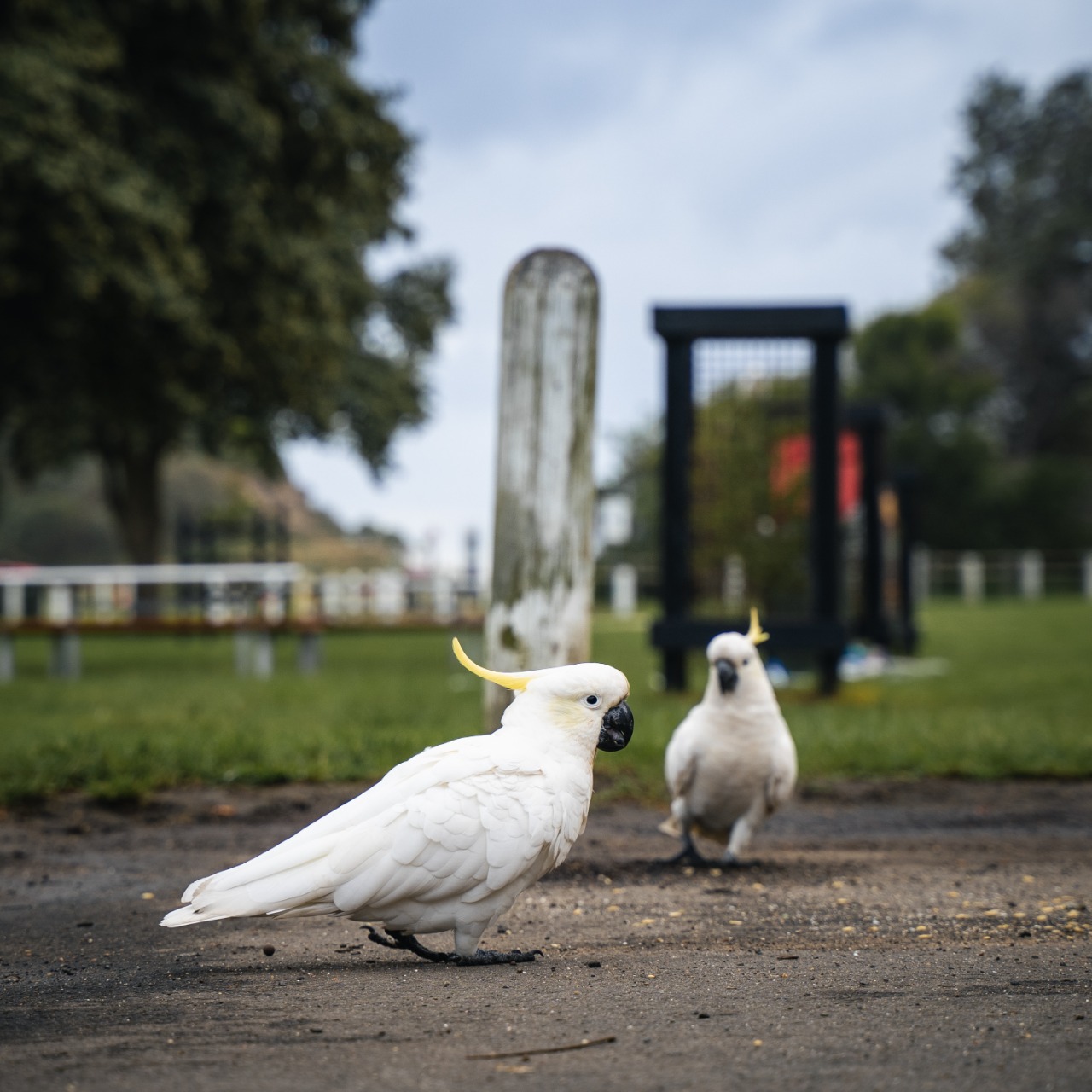
Origin: native to eastern Australia, New Guinea, Indonesia, and New Zealand
Size: 19 inches
Weight: 25 ounces
Life Span: up to 70 years.
Because of its distinctive yellow crest, the sulfur-crested cockatoo (Cacatua galerita) is easily identified.
They are certainly loving and caring, yet they have a plethora of care requirements and may live for up to 70 years.
They need constant supervision, a big cage, and at least four hours of daily freedom outside the cage, preferably more.
The sulfur-crested cockatoo is one of the most friendly and intelligent parrot breeds. They’re fantastic mimics who can talk in whole phrases. Their deafening shriek is not for the faint of heart.
How smart is a sulfur-crested cockatoo? It is considered the most intelligent parrot by most bird enthusiasts. It is considered to have the learning ability of a 1-2-year-old human baby.
9. Blue-and-Gold Macaw (blue and yellow parrot)
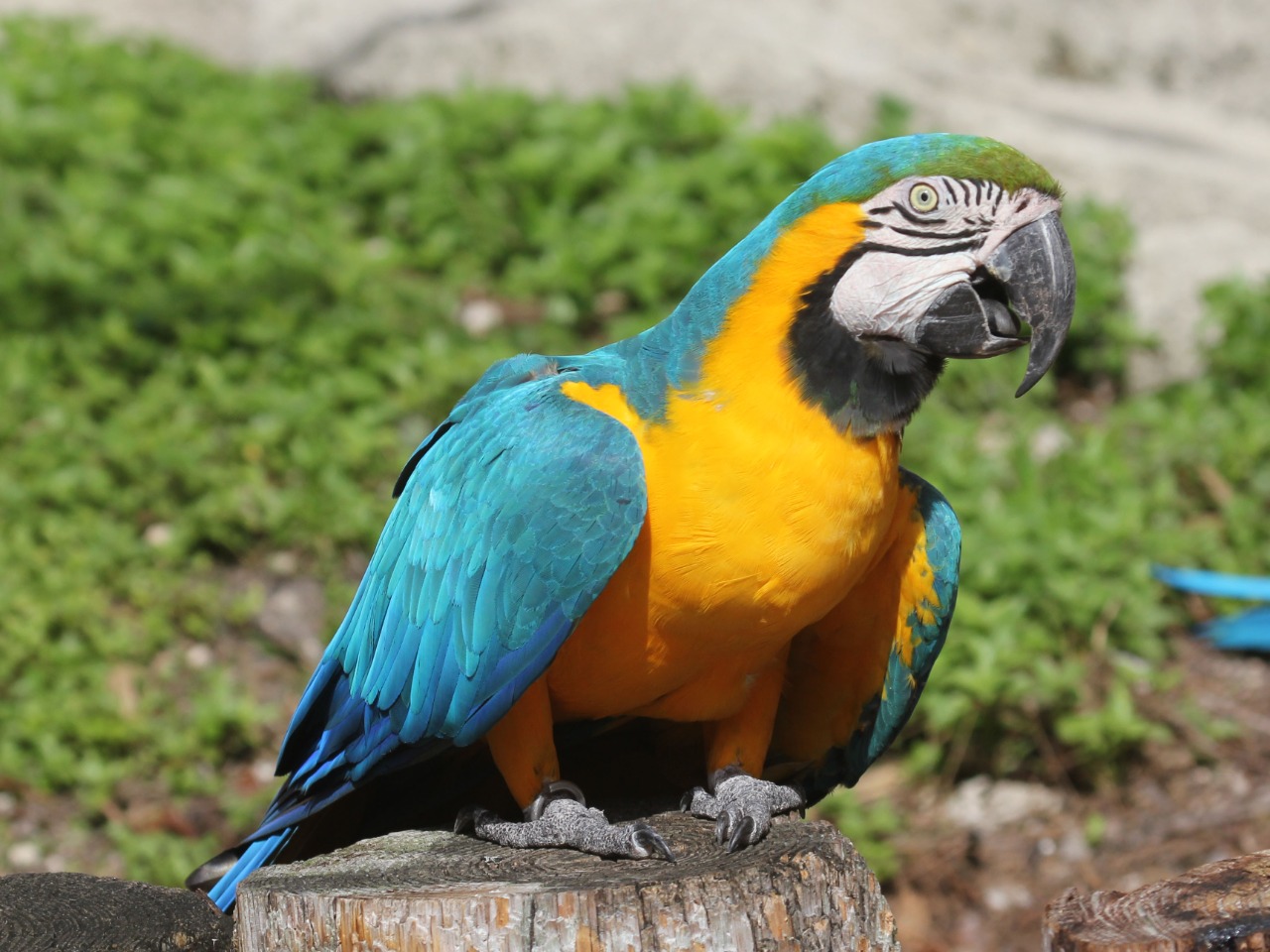
Origin: Native to the tropical lowlands, savannah, and swamplands of Brazil, the Guianas, Bolivia, Venezuela, and far south-eastern Peru.
Size: 12 inches
Weight: 4-6 ounces
Life Span: 25-40 years
These parrots are somewhat yellow, since they are primarily gold and blue macaws, as their name suggests. However, when compared to other yellow parrots, their attractiveness is especially dazzling. They are ideal pets for anyone who can devote a significant amount of time to talking to these intelligent parrots. They like listening to harsh and loud voice sounds and need a large room in which to play.
All macaw families are recognized for being amusing pets since they can learn a variety of behaviors from other birds, such as talking. They are 30-36 inches long from head to tail and weigh 28 to 46 ounces, making them the largest yellow parrot on the planet.
Usually, they have a green forehead that fades towards the rear of their neck, tail, wings, and back. They have yellow underwings and yellow breasts. Their beak is huge and black.
10. Double Yellow-Headed Amazon (yellow-green parrot)
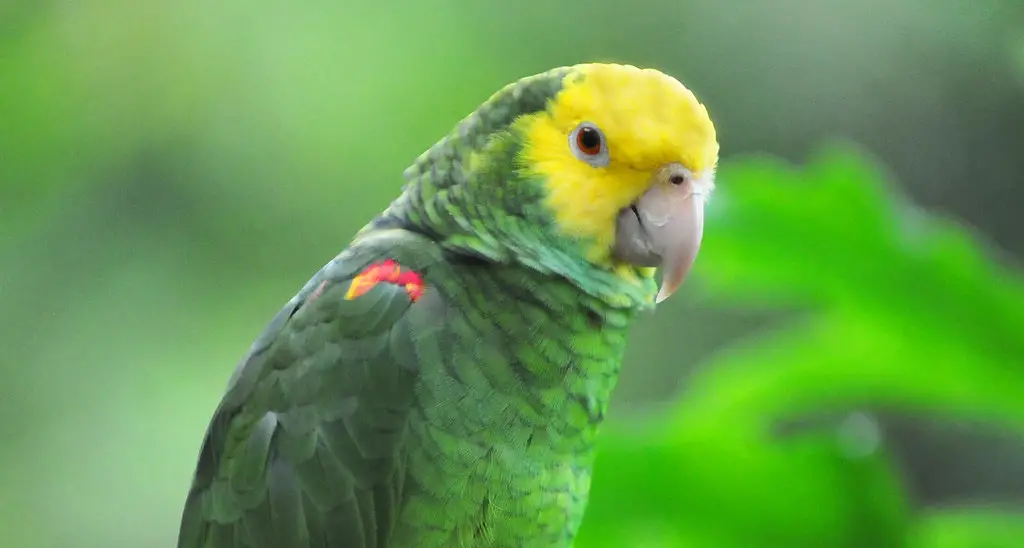
Origin: Amazon River’s banks and South America
Size: 15-17 inches
Weight: 16-23 ounces
Life Span: 40 to 60 years.
The heads of the amazon parrots are brilliant yellow. Because they are popular pet birds from the Amazon group, they have been given the name Amazon. They are naturally clever and can effortlessly duplicate not just sounds and words, but whole sentences. Though these yellow parrots are naturally loving and lively, they may become sad and destructive if their carer does not spend enough time with them.
If you keep them as pets, you should be prepared to look after them for decades, since their typical lifetime is up to 60 years. They are 15-17 inches long and weigh 16-23 ounces on average. They have a yellow head and green body, a tan beak, white rings around their eyes, and crimson wings when they bend.
What Causes Parrots to Turn Yellow?
Many birds get their color from their nutrition, but parrots are an exception.
Instead, psittacofulvine is responsible for the color of a parrot’s feathers (psittacines.) These are the chromophores produced by a parrot’s body.
Such an explanation just serves to create further questions, the most basic of which is “What are chromophores?”
The pigments that give humans and other animals color are comparable to these molecules. Light is absorbed by chromophores, and the parrot’s feathers reflect accordingly.
When a parrot spends time with other yellow birds, internal psittacines replicate their color.
Why Are Yellow Parrots So Rare?
It’s a question of life and death.
Parrots are prey animals in their natural habitat. Parrots are hunted for food by larger birds, such as raptors, eagles, hawks, and owls. Snakes, monkeys, and large cats are some of the other natural predators.
While parrots have formidable beaks and can fight themselves if confronted, they find it simpler to avoid detection. This is due to the evaluation process.
Humans and predators alike are drawn to bright yellow feathers. While people may find these hues appealing, a wild animal sees them as a call to “come and grab me.”
As a consequence, in a parrot’s natural habitat, green is the color of camouflage.
Although a yellow parrot’s plumage makes it easier for predators to see it, it has its benefits. Brightly colored parrot feathers are less likely to be degraded by microorganisms, according to Biology Letters.
What Does a Yellow Parrot Cost?
Because yellow parrots are rather uncommon, you may have to spend extra for one as a pet. These parrot breeds may be considered more exotic than common parrot species.
This table provides an estimate of how much you may need to spend. Naturally, pricing is influenced by supply and demand, as well as who you choose to deal with.
Budgerigar
Costs between 10 to $40
Cockatiel
Costs between $75 to $250.
The Golden Conure
Costs between $1,000 to $2,000
Lovebirds
Costs between $20 to $2,000
Pacific Parrotlet
Costs between $200 to $300
Sulfur-Crested Cockatoo (Sulfur-Crested Cockatoo)
Costs between $2,000 to $4,000
Conure of the Sun
Costs between $500 to $1,500.
What Is the Average Life Expectancy of Yellow Parrots?
According to this chart of typical lifespans, a well-cared-for parrot may give company for decades. Make sure you’re ready to commit to what will almost certainly be a long-term commitment.
Budgerigar
5-8 years, however, English budgies live longer.
Cockatiel
30 years or more
Golden Conure
ranges from 16 to 25 years, with certain exceptions.
Lovebirds
10 to 20 Years
Parrotlet of the Pacific
Depending on breeding, 20–30 years.
Sulfur-Crested Cockatoo (Sulfur-Crested Cockatoo)
It usually lives between 20 and 40 years, although it may live up to 70 years.
Sun Conure
ranges between 15 and 30 years.


![34 Beautiful Black Birds With White Stripes On Wings [images + IDs]](https://birdsology.com/wp-content/uploads/2022/09/23-600x400.jpg)
![When To Put Out A Hummingbird Feeder [Detailed Guide]](https://birdsology.com/wp-content/uploads/2024/01/15522.webp-600x400.webp)
